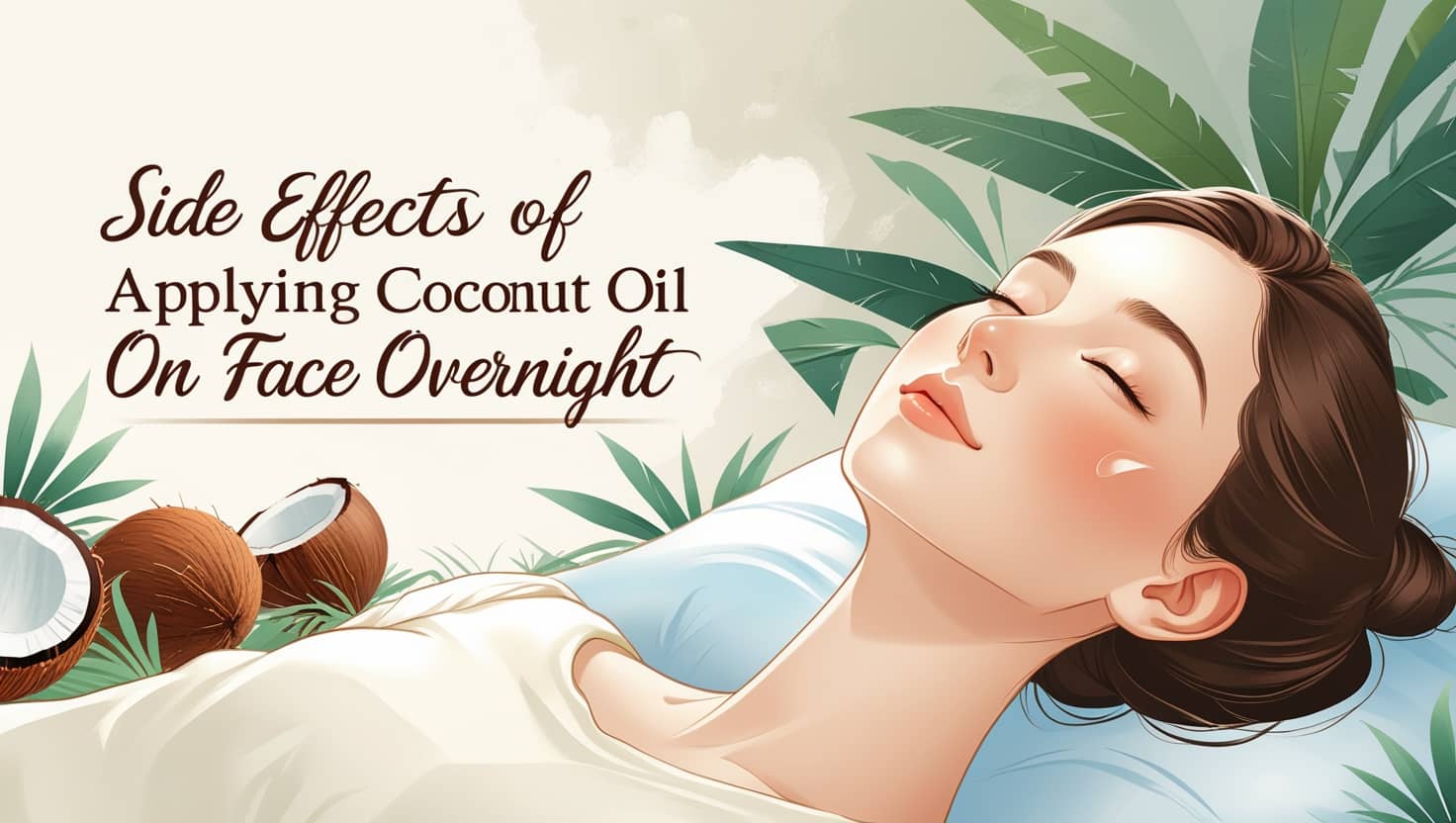Virgin coconut oil (VCO) is a pure processed natural oil derived from fresh, ripe coconut kernels. It exhibits a variety of biological actions, including anticancer, antibacterial, analgesic, antipyretic, and anti-inflammatory effects. Coconut oil was used to hydrate and heal skin diseases. In this article, we will learn more about the side effects of applying coconut oil on face overnight.
Common Side Effects of Using Coconut Oil on Skin
Coconut oil has a wide range of skin benefits, including; Moisturizing dry skin, especially for those with eczema, reducing irritation caused by UVB radiation, and promoting wound healing with antibacterial, antifungal, and antiviral activities.
Many studies showed the side effects of applying coconut oil on face overnight. including the following:
- Coconut oil may help prevent and cure rashes, such as atopic dermatitis.
- Another study shows that coconut oil extract improved skin barrier function and reduced inflammation caused by UVB radiation.
- Coconut oil is excellent in wound healing and boosting collagen synthesis.
Who Should Avoid Coconut Oil for Skincare?
It is not recommended to use coconut oil on oily acne-prone skin. Some people use coconut oil to wash and moisturize their skin.
This may help with acne; however, it is not suggested for persons with extremely oily skin.
Coconut oil is extremely comedogenic, which means it can block pores. As a result, it may aggravate some people’s acne.
Alternatives to Coconut Oil for Overnight Skin Treatment
Grape Seed Oil
Includes high quantity of resveratrol which has direct antibacterial efficacy against pathogens like Staphylococcus aureus and Enterococcus faecalis.
Grape seed oil has a high concentration of linoleic acid, vitamin E, and phenols. it also contains phenolic compounds, resveratrol, and vitamin E, which constitute the majority of its antioxidants.
Argan Oil
Argan oil contains both monounsaturated and saturated fatty acids.
Daily topical use of argan oil enhances skin softness and hydration by restoring barrier function and preserving water-holding capacity similar to the side effects of applying coconut oil on face overnight.
Furthermore, topical treatments onto skin give a soothing impact on the skin,
Avocado Oil
Avocado oil from the fruit pulp is high in linoleic, linolenic, and oleic acids.
Additionally, it includes β-sitosterol, lecithin, β-carotene, minerals, and vitamins A, C, D, and E.
It is a wonderful source of nourishment for dry, injured, or chapped skin.
Jojoba Oil
Jojoba oil is an excellent remedy for skin conditions with damaged skin barriers, including acne, eczematous dermatitis, seborrheic dermatitis, and AD, due to its high wax esters concentration.
In addition to its anti-inflammatory properties, jojoba oil may be useful for several skin disorders, including wound healing, infections, and aging.
Almond Oil
Because of its emollient and sclerosant features, almond oil enhances skin tone and complexion.
Also, topical almond oil can stop UV radiation-induced structural damage.
Shea Butter
Shea butter is extracted from the kernels of the shea tree and is rich in unsaponifiable substances and triglycerides including oleic, stearic, linoleic, and palmitic fatty acids.
Because of its high percentage of the unsaponifiable fraction” triterpenes, tocopherol, phenols, and sterols” -which have as strong anti-inflammatory and antioxidant effects- shea butter is increasingly used in the cosmetic sector.
Reference
Dresden, D. (2020, April 15). Is coconut oil good for your skin? Benefits and uses. Retrieved from www.medicalnewstoday.com website: https://www.medicalnewstoday.com/articles/coconut-oil-good-for-skin
Lin, T.-K., Zhong, L., & Santiago, J. (2017). Anti-Inflammatory and Skin Barrier Repair Effects of Topical Application of Some Plant Oils. International Journal of Molecular Sciences, 19(1), 70.
https://doi.org/10.3390/ijms19010070
Varma, S. R., Sivaprakasam, T. O., Arumugam, I., Dilip, N., Raghuraman, M., Pavan, K. B., … Paramesh, R. (2019). In vitro anti-inflammatory and skin protective properties of Virgin coconut oil. Journal of Traditional and Complementary Medicine, 9(1), 5–14.
https://doi.org/10.1016/j.jtcme.2017.06.012

Microbiology and Immunology Specialist | Scientific Writer
Lina Mahmoud Ahmed graduated from Cairo University’s Faculty of Veterinary Medicine with a B.Sc. in Veterinary Medical Sciences and a diploma in Microbiology and Immunology. With extensive knowledge and hands-on expertise, Lina is dedicated to delivering accurate and well-researched medical content that simplifies complex information for readers. She can be reached at [email protected].







